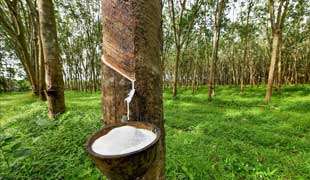Bukit Tigapuluh National Park in Sumatra, Indonesia, may be one of the world’s great ecological hotspots, containing plants and animals found nowhere else. However, sprawling oil palm and rubber plantations outside the park’s boundaries are thought to infringe on the dense jungle and endanger animal habitats.
Indonesia is the world’s second-largest producer of natural rubber (NR), after Thailand. NR is used to make tyres and other goods such as surgical gloves, footwear, hoses, and pipes.
A forest the size of Los Angeles was destroyed in 2020, largely as a result of the growth of palm oil and timber plantations. Government initiatives like a moratorium on destroying primary forests and peatlands have helped to slow the rate of deforestation. But the distinctive ecosystem of Bukit Tigapuluh National Park continues to be threatened by rising global demand for commodities like natural rubber.
The United Nations Environment Programme (UNEP) and several partners have channeled US$95 million into financing Indonesia rubber producers and assisting them in planting dense fields of trees on already marginal land, sparing virgin forests. According to experts, this innovative financial model is critical to slowing deforestation in the face of rising demand for Indonesia’s natural resources.
“This is a practical solution to accelerate investment in deforestation-free supply chains by providing long-term capital with strict sustainability-linked lending criteria to stimulate green growth and local livelihoods, protect biodiversity and shield agriculture production from future climate hazards,” said Mirey Atallah, Head of the Nature for Climate Branch at UNEP.
The Tropical Landscape Finance Facility is a collaboration between the UNEP, the Indonesian Ministry of Environment and Forests, ADM Capital, BNP Paribas, and local non-governmental organisations. It provides long-term financing at market rates to projects and businesses that promote green growth and improve rural livelihoods.
The initiative, which brought together teams from across the government, navigated complex issues such as historical deforestation and land ownership disagreements.
In addition to funding compact rubber plantations, it assisted in the establishment of a 9,700 ha conservation area adjacent to Bukit Tigapuluh National Park, which has served as a transit corridor for elephants, tigers, orangutans, sun bears, and various endangered bird species.
Loans under the Tropical Landscape Finance Facility are made contingent on meeting ambitious environmental and social impact targets. According to its supporters, the model ensures project accountability by tying environmental and social commitments to receiving below-market-rate financing. They believe the model can be replicated in other countries, fostering sustainable commodity markets that will protect nature, address the climate crisis, and improve rural communities’ lives.

